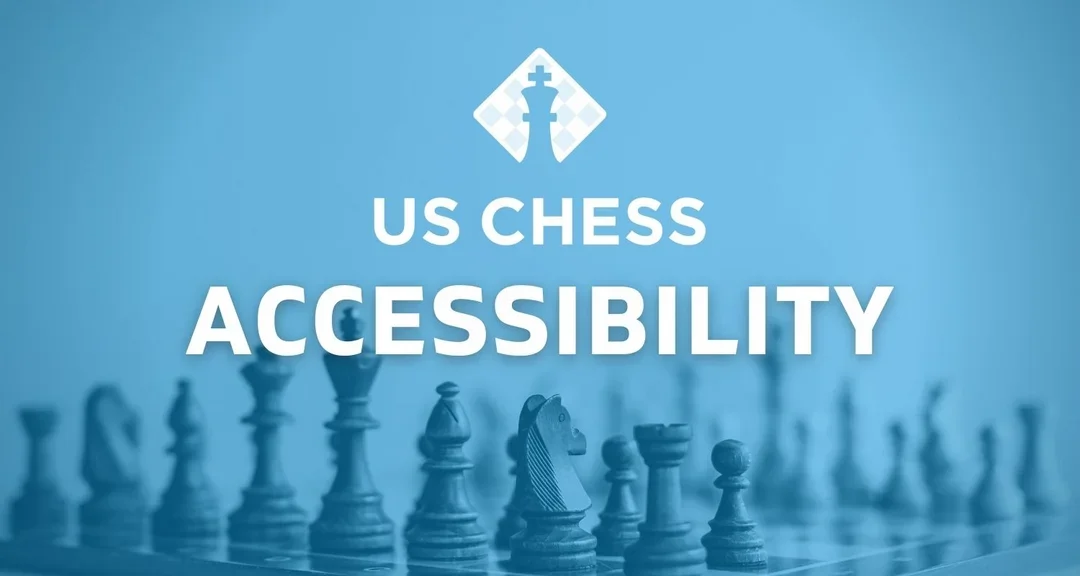
US Chess believes that everyone has a seat at the chess table.
Central to the mission of US Chess is a belief that chess can be enjoyed by everyone, regardless of one’s circumstances. This belief is reflected in the work of US Chess — tournaments for all ages, activities designed to bring more girls and women into chess, programs that remove financial barriers to enjoying the game, and accommodations for players with disabilities. The US Chess Executive Board has repeatedly stated its commitment to providing access to chess and broadening the community of players that can benefit from and enjoy the game.
In 2019, the US Chess Accessibility and Special Circumstances Committee (“Accessibility Committee”) developed guidelines to assist organizers and tournament directors with offering chess events that are accessible for players with disabilities. Guided by the philosophy embedded in the federal Americans with Disabilities Act of 1991 (“ADA”), the US Chess Executive Board established a vision that imagines an inclusive chess community. This vision is consistent with the spirit of the ADA — a law that requires organizations operating in public places to offer “reasonable accommodations” to people with disabilities. The ADA is not about special treatment. It’s about providing equal access to services offered in public places.
The Accessibility Committee offers broad guidance for how chess organizers and tournament directors can provide accommodations to people with disabilities. Through a series of upcoming posts on CLO, the Accessibility Committee will provide information about accommodations for players with disabilities. Among the topics expected to be presented are:
- Chess and Disability
- Temporary vs Permanent Disabilities
- How-to’s on Requesting Accommodations
- Electronic Devices
- Equality versus the US Chess Rules: Case Studies
- Respect for All
As the CLO series rolls out, US Chess reaffirms its commitment to inclusivity in chess. During the coming year, the Accessibility Committee also will host a webinar covering additional topics and provide a forum for organizers and tournament directors to ask questions and offer solutions from their own broad experience.
We hope you benefit from the inevitable dialogue we hope will emerge from this series. If you have questions about the content of this, or future, posts, or about how to offer an appropriate accommodation, please email us at Click here to show email address and a member of the Accessibility Committee will be in touch.
Categories
Archives
- January 2026 (8)
- December 2025 (27)
- November 2025 (29)
- October 2025 (39)
- September 2025 (27)
- August 2025 (29)
- July 2025 (43)
- June 2025 (25)
- May 2025 (24)
- April 2025 (29)
- March 2025 (29)
- February 2025 (20)
- January 2025 (24)
- December 2024 (34)
- November 2024 (18)
- October 2024 (35)
- September 2024 (23)
- August 2024 (27)
- July 2024 (44)
- June 2024 (27)
- May 2024 (31)
- April 2024 (51)
- March 2024 (34)
- February 2024 (25)
- January 2024 (26)
- December 2023 (29)
- November 2023 (26)
- October 2023 (37)
- September 2023 (27)
- August 2023 (37)
- July 2023 (47)
- June 2023 (33)
- May 2023 (37)
- April 2023 (45)
- March 2023 (37)
- February 2023 (28)
- January 2023 (31)
- December 2022 (23)
- November 2022 (32)
- October 2022 (31)
- September 2022 (19)
- August 2022 (39)
- July 2022 (32)
- June 2022 (35)
- May 2022 (21)
- April 2022 (31)
- March 2022 (33)
- February 2022 (21)
- January 2022 (27)
- December 2021 (36)
- November 2021 (34)
- October 2021 (25)
- September 2021 (25)
- August 2021 (41)
- July 2021 (36)
- June 2021 (29)
- May 2021 (29)
- April 2021 (31)
- March 2021 (33)
- February 2021 (28)
- January 2021 (29)
- December 2020 (38)
- November 2020 (40)
- October 2020 (41)
- September 2020 (35)
- August 2020 (38)
- July 2020 (36)
- June 2020 (46)
- May 2020 (42)
- April 2020 (37)
- March 2020 (60)
- February 2020 (38)
- January 2020 (45)
- December 2019 (34)
- November 2019 (35)
- October 2019 (42)
- September 2019 (45)
- August 2019 (56)
- July 2019 (44)
- June 2019 (35)
- May 2019 (40)
- April 2019 (48)
- March 2019 (61)
- February 2019 (39)
- January 2019 (30)
- December 2018 (29)
- November 2018 (51)
- October 2018 (45)
- September 2018 (29)
- August 2018 (49)
- July 2018 (35)
- June 2018 (31)
- May 2018 (39)
- April 2018 (31)
- March 2018 (26)
- February 2018 (33)
- January 2018 (30)
- December 2017 (26)
- November 2017 (24)
- October 2017 (30)
- September 2017 (30)
- August 2017 (31)
- July 2017 (28)
- June 2017 (32)
- May 2017 (26)
- April 2017 (37)
- March 2017 (28)
- February 2017 (30)
- January 2017 (27)
- December 2016 (29)
- November 2016 (24)
- October 2016 (32)
- September 2016 (31)
- August 2016 (27)
- July 2016 (24)
- June 2016 (26)
- May 2016 (19)
- April 2016 (30)
- March 2016 (36)
- February 2016 (28)
- January 2016 (32)
- December 2015 (26)
- November 2015 (23)
- October 2015 (16)
- September 2015 (28)
- August 2015 (28)
- July 2015 (6)
- June 2015 (1)
- May 2015 (2)
- April 2015 (1)
- February 2015 (3)
- January 2015 (1)
- December 2014 (1)
- July 2010 (1)
- October 1991 (1)
- August 1989 (1)
- January 1988 (1)
- December 1983 (1)







